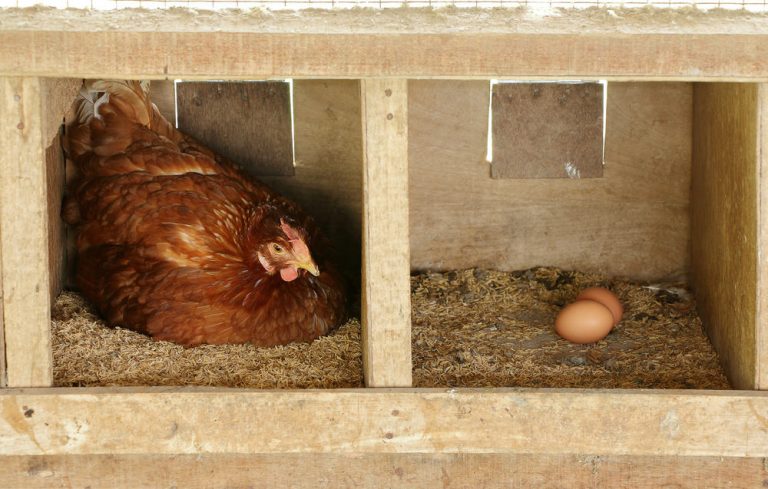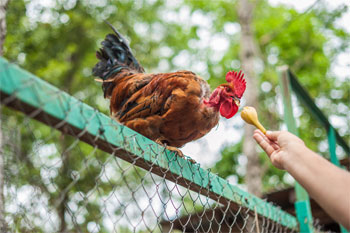The first pets that come to mind when we talk about affection are dogs and cats that show loyalty, cuddliness, and temperament. But did you know that chickens can show affection in much the same manner as dogs and cats?
Many people may not realize it, but if they are so keen, they will often see them looking intently into your eyes. They might just be trying to catch your attention or express their affection for you. It’s like your feathered friends telling you how much you mean to them without having words to say.
So, how do chickens show affection? Chickens will bond with you much like other pets, especially if you show them personalized care. With experience and research, we have come up with a few subtle ways in which chickens show affection to us and their flockmates.
Contents
Chickens’ Affection Toward Humans
Chickens can show affection for humans in several ways. Here are some common ways chickens may demonstrate their affection:
- Seeking Physical Contact: Chickens may approach humans and allow themselves to be touched or held. They may lean into your hand or rub against you, indicating a desire for physical contact and attention.
- Following: Chickens may develop a strong bond with their human caretakers and exhibit the following behaviors: They may follow you around, imitate your footsteps, or stay close to your side.
- Vocalization: Chickens can express their affection through various vocalizations. They may make contented clucking sounds or purr softly when near humans they trust.
- Preening: Chickens may try to preen their human caretakers by gently pecking or nibbling at their fingers, hair, or clothing. This behavior shows acceptance and an attempt to care for you as they would for their flockmates.
- Perching: Chickens may jump onto your lap or shoulder, seeking a higher vantage point or simply enjoying your presence. This behavior shows a level of comfort and trust.
- Excitement and Running: When chickens are happy to see you or anticipate treats, they may excitedly run towards you, flapping their wings and showing enthusiasm.
- Nesting Behavior: Chickens may choose to lay their eggs in places associated with their human caretakers, such as nesting boxes you provide for them. This behavior signifies trust and a sense of security.
- Alarm Calls: Chickens may sound alarm calls to warn humans of potential threats or dangers. This behavior demonstrates their protective instincts and their concern for your well-being.
It’s important to note that not all chickens will exhibit the same level of affection for humans. Chickens raised with positive human interactions from a young age are more likely to develop stronger bonds and exhibit more affectionate behaviors.
Building trust and spending quality time with your chickens can help foster a stronger connection and increase the likelihood of them showing affection towards you.
Chicken Affection Towards Mates
Chickens show affection to their fellow mates in various ways. Here are some ways chickens demonstrate their affection for each other:
- Preening: Chickens engage in preening behavior as a way to bond and show affection. They gently peck at each other’s feathers, often focusing on hard-to-reach areas like the head and neck. Preening helps to maintain feather health and strengthen social bonds within the flock.
- Nuzzling: Chickens may nuzzle against each other, touching their beaks or bodies together. This physical contact is a way for chickens to express affection and reinforce their social connections.
- Cuddling and Huddling: Chickens seek out close physical contact with their flockmates. They often huddle together for warmth, comfort, and a sense of security. This behavior is particularly common during sleep or when they are resting.
- Roosting Together: Chickens prefer roost together on perches or high places. Sharing a roosting spot shows trust, safety, and camaraderie among flock members.
- Sharing Food: Chickens may show their affection by sharing food with each other. They may pick up and drop food to invite others to eat, or they may peck at the ground to uncover treats and allow others to partake in the findings.
- Vocalization: Chickens have a range of vocalizations, and some sounds can be associated with affection and bonding. They may make soft clucking or cooing sounds, signaling contentment and a harmonious flock atmosphere.
- Comforting Behavior: When a chicken is injured or unwell, other flock members often display caring behavior. They may gather around the affected chicken, offering support, warmth, and protection.
- Nesting Together: Chickens may choose to share nests while laying eggs, demonstrating a sense of trust and cooperation within the flock.
- Playing and Chasing: Chickens engage in playful activities, such as chasing each other or engaging in friendly sparring. These interactions can strengthen social bonds and provide entertainment for the flock.
- Establishing a Pecking Order: While it may not seem affectionate initially, it is a natural behavior among chickens. It helps maintain order within the flock and can contribute to a sense of stability and hierarchy, ultimately promoting social harmony.
It’s important to note that chickens, like any animal, may have individual differences in their behavior and level of affection. Factors such as their age, breed, and socialization experiences can influence their interactions and displays of affection towards their flockmates.
Also read: Best Egg Skelter Reviews & Buying Guide
What Happens If Affection Is Lacking?
Just like in humans and among animals, a lack of affection is associated with many problems, especially in health and behavior. The lack of affection or social interaction among chickens can have negative effects on their well-being and behavior. Here are some potential consequences of a lack of affection among chickens:
Increased Stress
Chickens are social animals that thrive on social interactions and companionship. Without adequate affection and socialization, chickens can experience increased stress levels. Social isolation can lead to anxiety and discomfort, affecting their overall health and behavior.
Aggression and Pecking
Chickens that lack socialization and affection may exhibit more aggressive behaviors, including pecking and bullying other flock members. Social interactions and affectionate behaviors help establish a harmonious pecking order and reduce aggressive tendencies within the flock.
Reduced Immune Function
Chronic stress resulting from a lack of affection and social interaction can weaken the immune system of chickens. This can make them more susceptible to diseases and infections, compromising their overall health and well-being.
Feather Pecking and Feather Loss
Chickens that do not receive enough social interaction and affection may resort to feather pecking, where they peck at the feathers of themselves or other flock members. This behavior can escalate and lead to feather loss, skin injuries, and increased stress within the flock.
Decreased Egg Production
Social interactions and positive experiences play a role in the reproductive health of chickens. A lack of affection and socialization can disrupt their reproductive cycles, leading to a decrease in egg production or even infertility in some cases.
Abnormal Behavior
Chickens that are deprived of affection and social contact may exhibit abnormal behaviors such as excessive pacing, feather picking, or self-mutilation. These behaviors are signs of distress and can indicate the negative impact of social isolation on their mental and emotional well-being.
Reduced Learning and Cognitive Development
Chickens raised without affection and social interactions may have limited opportunities for learning and cognitive development. Social interactions are important for the transmission of knowledge and social learning within the flock, allowing chickens to acquire essential skills and behaviors.
Conclusion
Providing chickens with ample socialization, including affectionate interactions, is crucial for their overall welfare and happiness. Ensuring a stimulating and enriching environment with opportunities for social bonding can help prevent the negative effects associated with a lack of affection among chickens.



